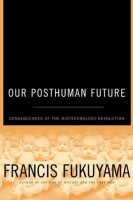kategóriák
- Közlekedés ajánlójegyzék
- Szocreál ajánlójegyzék
- Reklám ajánlójegyzék
- Fotó ajánlójegyzék
- Kínai-japán ajánlójegyzék
- Szentkép ajánlójegyzék
Új árakkal! - Új szentkép ajánlójegyzék II.
- 12 érdekes régiség
 Könyv
Könyv
 Bibliofilia
Bibliofilia
 Régiség
Régiség
 Metszet
Metszet
 Térkép
Térkép
 Fotó
Fotó
 Papírrégiség, Aprónyomtatvány
Papírrégiség, Aprónyomtatvány
 Plakát
Plakát
- Cirkusz
- Modern grafika
- Szocreál
- NER Irodalom
- Egyéb
kosár
üres a kosár
nincs bejelentkezve
Fukuyama, Francis : Our Posthuman Future
- leírás
- további adatok
In 1989, Francis Fukuyama made his now-famous pronouncement that because "the major alternatives to liberal democracy had exhausted themselves," history as we knew it had reached its end. Ten years later, he revised his argument: we hadn't reached the end of history, he wrote, because we hadn't yet reached the end of science. Arguing that our greatest advances still to come will be in the life sciences, Fukuyama now asks how the ability to modify human behavior will affect liberal democracy. To re-orient contemporary debate, Fukuyama underlines man's changing understanding of human nature through history: from Plato and Aristotle's belief that man had "natural ends," to the ideals of utopians and dictators of the modern age who sought to remake mankind for ideological ends. Fukuyama persuasively argues that the ultimate prize of the biotechnology revolution-intervention in the "germ-line," the ability to manipulate the DNA of all of one person's descendents-will have profound, and potentially terrible, consequences for our political order, even if undertaken by ordinary parents seeking to "improve" their children. InOur Posthuman Future, our greatest social philosopher begins to describe the potential effects of exploration on the foundation of liberal democracy: the belief that human beings are equal by nature. Francis Fukuyamais Bernard Schwartz Professor of International Political Economy at the Paul H. Nitze School of Advanced International Studies, The Johns Hopkins University. In 2002, he was appointed to the President's Council on Bioethics. He is the author ofThe Great Disruption: Human Nature and the Reconstitution of Social Order, Trust: The Social Virtues and the Creation of Prosperity,andThe End of History and the Last Man, among other works. He lives in McLean, Virginia. ANew York TimesNotable Book ALos Angeles TimesBest Book AChoiceOutstanding Academic Title InOur Posthuman Future,Fukuyama describes the potential effects of the biotechnology revolution on the foundation of liberal democracy: the belief that human beings are equal by nature. In 1989, he made his now-famous pronouncement that because the major alternatives to liberal democracy had exhausted themselves, history as we knew it had reached its end. Ten years later, he revised his argument: we hadn't reached the end of history, he wrote, because we hadn't yet reached the end of science. Arguing that our greatest advances still to come will be in the life sciences, Fukuyama now asks how the ability to modify human behavior will affect liberal democracy. To reorient contemporary debate, Fukuyama underlines man's changing understanding of human nature through history: from Plato and Aristotle's belief that man had "natural ends" to the ideals of utopians and dictators of the modern age who sought to remake mankind for ideological ends. Fukuyama persuasively argues that the ultimate prize of the biotechnology revolutionintervention in the "germ-line," the ability to manipulate the DNA of all of one person's descendentswill have profound, and potentially terrible, consequences for our political order, even if undertaken by ordinary parents seeking to "improve" their children. "Fukuyama has written an invaluable prescription for government regulation. Rarely has someone entering the policy arena so eloquently and precisely laid out the case for political control of emerging technology."Robert Lee Hotz,Los Angeles Times Book Review "Fukuyama has written an invaluable prescription for government regulation. Rarely has someone entering the policy arena so eloquently and precisely laid out the case for political control of emerging technology."Robert Lee Hotz,Los Angeles Times Book Review "Fukuyama gives a fascinatin
| állapot: |      |
| kategória: | Könyv > Idegennyelvű könyvek > Angol nyelvű > |
| kiadó: | FSG, 2002 |
| cikkszám / ISBN: | 9780374236434 |
| kötés: | kötve/papír (kiadói, eredeti védőborítóban) |
| oldalszám: | 256 |
| könyv nyelve: | angol |


























 Telefon:
Telefon: E-mail:
E-mail:







